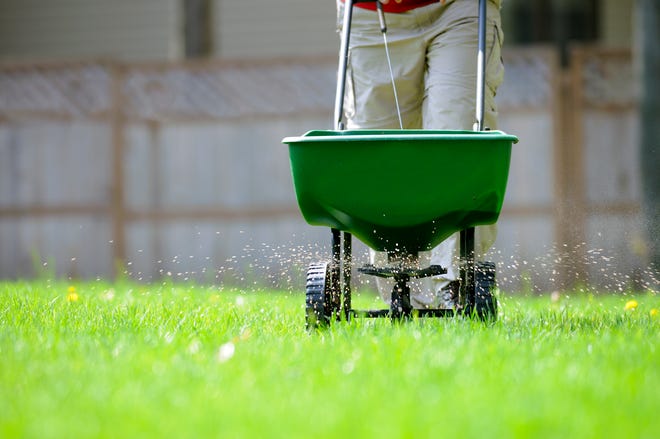Gardening: March is here – Spring fertilizing is very important

March is here. It is usually the start of our dry season. Springtime can be very hard on our lawns and shrubs as the temperatures will begin to rise and we will become increasingly dry.
It is important to keep a close eye on your irrigation system. It is also a good time to prepare your yard for summer growth.
The spring fertilizing is a very important one to bring your lawn, shrubs and trees from the dormancy of winter into the growing season. Lawn fertilizer will produce new green shoots to replace the brown blades caused by the cold weather.
Plants and trees will really begin to recover from any winter cold damage as we enter the warmer spring months. Fertilizer will help speed this process.
Gardenias, ixoras, azaleas and other acid-loving plants should get a special fertilizer containing essential elements for acid-loving plants. If you didn’t fertilize your citrus trees in January or February, before they flowered, wait until the tree has set small fruit to fertilize as nitrogen can cause the blossoms to drop and this will drastically reduce your fruit crop for next year. But be sure to give the citrus fertilizer to help the fruit grow and mature.

This is also the time to drastically prune any plants that have become too leggy or large by thinning and heading back. Clean out any dead wood caused by Hurricane Ian, winter cold or disease. Remove any crossing or interfering branches so they don’t rub each other and cause damage. Poinsettias should be trimmed back now for flowering next winter. Do not prune your gardenias yet. They flower on old growth from last summer. If you prune now you will cut off many of your flower buds due to open soon. Prune gardenias when they finish flowering in early summer.
Insect populations will be on the rise. Aphids love all the tender new growth on shrubs and trees. Citrus are especially enticing to aphids. Spray with insecticidal soap for control or watch for lady bugs and other natural predators. They are voracious aphid feeders.
Mites are very active when it is dry. Watch for dappled discoloration on the older leaves of ornamentals. Mites are too small to see on the leaves. They live on the underside of the leaves and can be seen by shaking the leaves over a piece of white paper. Watch for little specks running around and those will be mites. Treat with a miticide.
Grubs will be awakening from their winter hibernation deep in the soil. They will rise to the surface to feed on lawn roots. Watch for areas on the lawn that look like water stress. If irrigation is in proper working order, check for grubs. Grab a handful of grass and pull up. If there is no resistance from roots dig in the soil beneath the spot and you’ll probably unearth a white grub. Treat with Dylox, a granular insecticide. Grubs tend to stay deeper in the soil when it’s dry so if there haven’t been any recent rains irrigate before treatment to bring them to the surface. Apply the insecticide and water it in well to penetrate the soil where the grubs live.
It is a good time to mulch to help retain soil moisture. March can be very windy and dry. Both conditions cause serious evaporation from our sandy soil.
Lawns can also suffer much stress from these conditions. Be sure your irrigation system is in good working order with heads cleared and covering properly. Dry areas are more susceptible to insect and disease problems. Don’t mow your lawn every week. Let the blades grow to help shade and protect the crown from the hot sun and drying winds. Mowing adds extra stress to a lawn already stressed by drought conditions. Wait until the grass really needs to be cut before doing so and you will be rewarded with a lush, green lawn all through the dry, spring months.
Complete your March chores and you can relax again until the summer rains begin in June. Then your efforts will be rewarded with more healthy, lush growth than you probably will care to deal with!
MoreGardening: February – The last slow month for yard chores
AndGardening: Light up your nights in the garden
Peter and Eileen Ward have sold Greensward of Marco after 40 years in the lawn and landscape business on Marco Island. You can reach Eileen with comments or questions on her columns via email at Gswdmarco@comcast.net or call 239-269-0192.